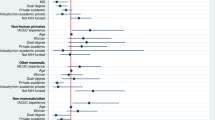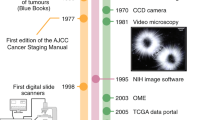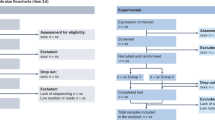Abstract
Laboratory animal medicine professionals must be able to integrate information from a variety of sources to make sound decisions. To address concerns from preveterinary and veterinary students that information about the specialty is difficult to locate, the authors examined the utility of electronic search engines to provide links to appropriate websites of significant educational value to the field. They assembled this reference document to assist veterinary students, residents, and postdoctoral fellows in the acquisition of online texts, journals, newsletters, government regulations, and other sources of current information as they relate specifically to laboratory animal medicine.
This is a preview of subscription content, access via your institution
Access options
Subscribe to this journal
We are sorry, but there is no personal subscription option available for your country.
Buy this article
- Purchase on Springer Link
- Instant access to full article PDF
Prices may be subject to local taxes which are calculated during checkout

Similar content being viewed by others
References
Fielder, T.J. Email lists in laboratory animal science. Lab Anim. (NY) 31(10), 40–44 (2002).
Donnelly, T.M. Free Web resources on alternatives. Lab Anim. (NY) 33(3), 46–48 (2004).
Hakkinen, P.J. & Green, D.K. Alternatives to animal testing: information resources via the Internet and World Wide Web. Toxicology 173(1–2), 3–11 (2002).
Haywood, J.R., Greene, M., James, M.L. & Bayne, K. Engaging the IACUC through comprehensive training. Lab Anim. (NY) 34(10), 33–37 (2005).
Biermann, J.S., Golladay, G.J., Greenfield, M.L. & Baker, L.H. Evaluation of cancer information on the Internet. Cancer 86(3), 381–390 (1999).
Poppenga, R.H. & Spoo, W. Internet resources for veterinary toxicologists. Toxicology 173(1–2), 179–189 (2002).
LaPorte, R.E. et al. The death of biomedical journals. BMJ 310(6991), 1387–1390 (1995).
Golladay, G.J., Kirschenbaum, I.H., Matthews, L.S. & Biermann, J.S. Internet resources for orthopaedic surgeons. J. Bone Joint Surg. Am. 80(10), 1525–1532 (1998).
Boschert, K. Veterinary Medicine on the Information Superhighway. Semin. Vet. Med. Surg. (Small Anim.) 11(2), 100–112 (1996).
Bichakjian, C.K. et al. Melanoma information on the Internet: often incomplete—a public health opportunity? J. Clin. Oncol. 20(1), 134–141 (2002).
Acknowledgements
The authors thank their veterinary colleagues, including K. Hankenson, T. Meier, I. Bolton, and J. Keller, for their helpful review and critique of the manuscript, J. Deneen for his computer expertise, and the American College of Laboratory Animal Medicine and the Unit for Laboratory Animal Medicine for joint financial support of J. DenHouter in the summer of 2005.
Author information
Authors and Affiliations
Corresponding author
Ethics declarations
Competing interests
The authors declare no competing financial interests.
Rights and permissions
About this article
Cite this article
DenHouter, J., Hankenson, F. Web searches for laboratory animal medicine: using the “mouse” for access to online resources. Lab Anim 35, 29–35 (2006). https://doi.org/10.1038/laban0606-29
Received:
Accepted:
Issue Date:
DOI: https://doi.org/10.1038/laban0606-29



